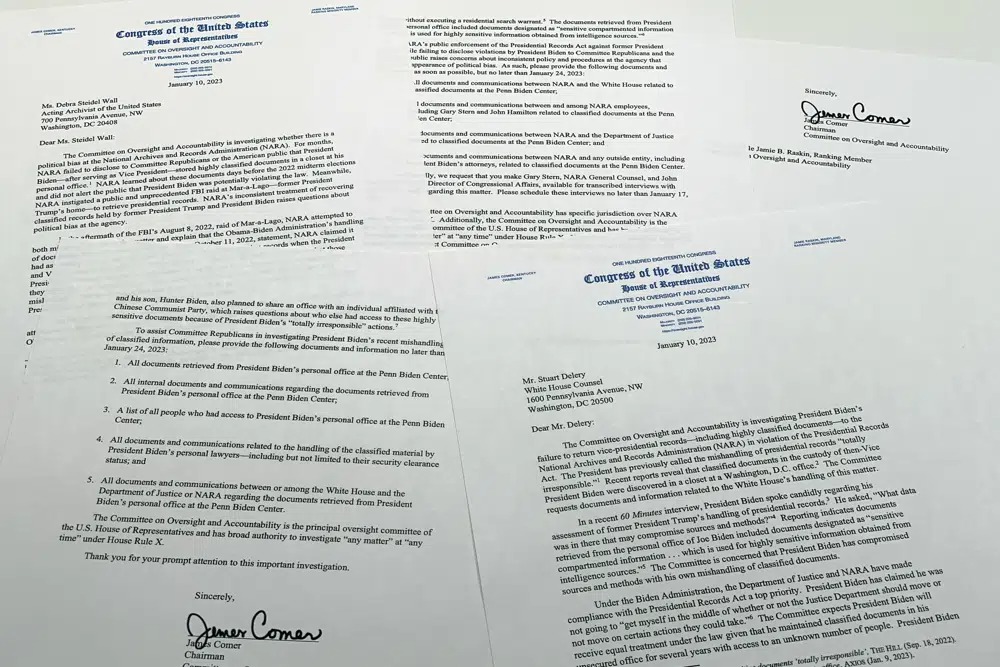Hillary Clinton’s presidential dreams were undermined by her use of a private email server that included classified information.
Donald Trump has risked criminal charges by refusing to return top-secret records to the government after leaving the White House.
And now misplaced files with classified markings could cause a political headache for President Joe Biden.
The three situations are far from equivalent. But taken together, they represent a remarkable stretch in which document management has been a recurring source of controversy at the highest levels of American politics.
For some, it’s a warning about clumsiness or hubris when it comes to handling official secrets. For others, it’s a reminder that the federal government has built an unwieldy — and perhaps unmanageable — system for storing and protecting classified information.
“Mistakes happen, and it’s so easy to grab a stack of documents from your desk as you’re leaving your office, and you don’t realize there’s a classified document among those files,” said Mark Zaid, a lawyer who works on national security issues. “You just didn’t hear about it, for whatever reason.”
Now Americans are hearing about it all the time. Political talk shows have been clogged with conversations about which papers were stashed in which box in which closet. Voters are getting schooled in intelligence jargon like TS/SCI, HUMINT and damage assessments.
Clinton’s email server was a dominant storyline of her presidential campaign, and the criminal investigation into Trump has clouded his hopes of returning to the White House. Republicans who recently took control of the House are now poised to examine Biden’s own document practices as well, especially after a second batch of classified material was found.
“The American people are very well aware of issues involving classified documents in part because we’ve been talking about them for almost eight years,” said Alex Conant, a Republican political consultant.
That’s when a House Republican committee investigating the attack on the U.S. consulate in Benghazi, Libya, discovered that Clinton had used a private email account while serving as secretary of state. The revelation led to a federal investigation that didn’t result in any charges, but 110 emails out of 30,000 that were turned over to the government were determined to have had classified information.
Trump, who pummeled Clinton over her handling of the emails, won the election and swiftly demonstrated carelessness with secrets. He memorably discussed sensitive intelligence with the Russian ambassador to the United States, leading to concerns that he may have jeopardized a source who helped foil terrorist plots.
After disputing the results of his election defeat, Trump left office in haphazard fashion, and he brought boxes of government documents with him to Mar-a-Lago, his Florida resort. Some of them were turned over to the National Archives, which is responsible for presidential records, but he refused to provide others.
Eventually the Justice Department, fearing that national security secrets were at risk, obtained a search warrant and found more top secret documents at the resort.
A special counsel was appointed to determine whether any criminal charges should be filed in the case or a separate investigation into Trump’s attempts to cling to power on Jan. 6, 2021, when a mob of his supporters attacked the U.S. Capitol.
Larry Pfeiffer, a former intelligence official, said the situation with Trump’s documents is far different than ones he encountered while working in government.
During the time that Pfeiffer was CIA chief of staff, classified files turned up in the wrong place in presidential libraries a handful of times, he said.
“It just happens,” said Pfeiffer, now director of the Michael V. Hayden Center for Intelligence, Policy and International Security at George Mason University. “Mistakes get made, and stuff gets found.”
He said that seems more likely to be the case regarding the documents with classified markings that were found at an office used by Biden at the Penn Biden Center for Diplomacy and Global Engagement after his term as vice president ended.
Biden’s personal lawyers discovered the documents and contacted the White House counsel’s office, and the National Archives picked up the records the next day.
The situation appears like “an average, run-of-the-mill mistake” that’s “being handled in a by-the-book, textbook fashion,” Pfeiffer said.
However, he said it would be wise for the government to review its practices for managing documents during transitions between administrations. It’s been six years since Biden left the vice president’s office, meaning classified records have been in the wrong place for a long time.
“That’s not a good thing, no matter how anyone is playing it,” he said.
In addition to the files that were found at the Penn Biden Center, more classified material was identified in another location, a person familiar with the matter said Wednesday. It was unclear when or where the documents were found. The person was not authorized to discuss the matter publicly and requested anonymity.
Attorney General Merrick Garland asked a U.S. attorney to review the matter after the initial discovery, and House Republicans have said they will investigate as well.
Rep. James Comer, R-Ky., the new chairman of the House Committee on Oversight and Accountability, sent a letter to the White House on Tuesday saying that his panel will be investigating Biden’s “failure to return vice-presidential records — including highly classified documents.”
“The Committee is concerned that President Biden has compromised sources and methods with his own mishandling of classified documents,” Comer wrote.
Biden said this week he was surprised to learn about the documents, which were discovered in November but whose existence only became public this week. He said he didn’t know what kind of information they contained, and he said his team “did what they should have done” when they were found.
Miller, a former Justice Department spokesman who worked for Biden’s National Security Council last year, said it’s unlikely that such an episode would have made the news if it wasn’t for the concurrent Trump investigation.
“The Penn Biden Center would have turned this stuff in, it would have gone to the Archives, and that would have been the end of it,” he said.
Miller said the situation is a reminder that “the government classifies way too many documents.”
“There’s not a good process for declassifying them,” he said. “And when you create this structure, you’ve unnecessarily widened the universe of classified documents that could unintentionally be mishandled.”
It’s not a new problem, and it’s a concern that’s even shared by Biden’s top intelligence adviser, Avril Haines. In a letter to senators last year, Haines said there are “deficiencies in the current classification system,” calling it “a fundamentally important issue that we must address.”
However, Miller said, “no one has figured out a good answer to this problem.”
(AP)











